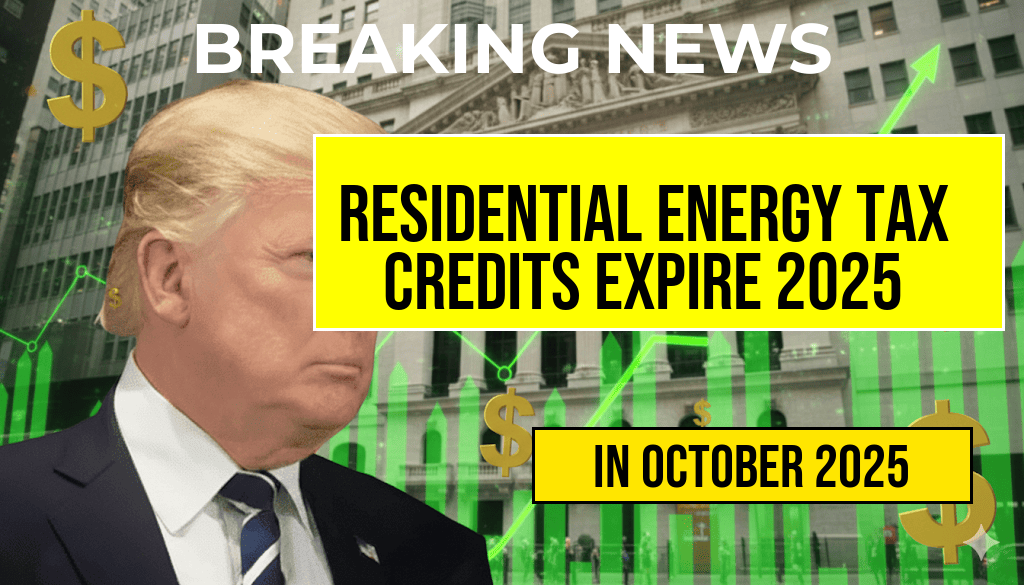As the deadline for various residential energy tax credits approaches, homeowners across the United States are urged to take advantage of these incentives before they expire after 2025. The federal government has been promoting green energy initiatives for years, providing tax credits that have significantly reduced the cost of energy-efficient home improvements. However, the impending expiration of these credits raises concerns among environmental advocates and homeowners alike, who fear that the end of these incentives could hinder the transition to renewable energy sources. With the clock ticking, understanding the implications of these changes is crucial for anyone interested in adopting sustainable practices at home.
The Role of Residential Energy Tax Credits
Residential energy tax credits have played a vital role in promoting energy efficiency and the adoption of renewable energy technologies. These credits allow homeowners to deduct a percentage of the costs associated with certain energy-efficient upgrades from their federal tax returns. Key areas covered by these credits include:
- Solar Energy Systems: Homeowners can receive a credit for installing solar panels, which can cover a significant portion of the installation costs.
- Energy-Efficient Windows: Replacing old windows with energy-efficient models can lead to substantial savings on energy bills, and homeowners can claim a percentage of the costs.
- Heating and Cooling Systems: Upgrading to Energy Star-rated heating and cooling systems is incentivized through tax credits, promoting lower energy consumption.
Current Tax Credit Landscape
As of now, several key tax credits are available to homeowners, including the Residential Energy Efficient Property Credit and the Energy Efficient Home Improvement Credit. These credits offer a significant financial incentive for individuals looking to invest in sustainable home improvements. However, the forthcoming expiration date means that homeowners need to act quickly to maximize their savings.
Impending Expiration and Its Implications
The expiration of these residential energy tax credits at the end of 2025 could have far-reaching consequences. Experts warn that without these financial incentives, many homeowners may be discouraged from investing in energy-efficient upgrades. This could stall progress in renewable energy adoption and hinder efforts to combat climate change. The potential drop in demand for energy-efficient products could also negatively impact manufacturers and installers, further slowing the transition to greener technologies.
What Homeowners Can Do
Homeowners looking to take advantage of these credits should consider the following steps:
- Assess Your Home’s Needs: Evaluate which upgrades could benefit your home the most in terms of energy efficiency.
- Consult Professionals: Engage with licensed contractors who specialize in energy-efficient installations to understand the best options available.
- Plan Ahead: Ensure that any installations are completed before the end of 2025 to claim the available tax credits.
The Future of Energy Incentives
As the expiration date nears, many advocates are pushing for legislation to extend these incentives beyond 2025. Organizations focused on sustainability argue that continued support for residential energy efficiency is essential for achieving national climate goals. The discussions surrounding the future of energy incentives are ongoing, with some lawmakers considering new proposals to encourage further investment in green technologies.
Community and State-Level Initiatives
In addition to federal tax credits, many states and local governments offer their own incentives for energy-efficient upgrades. Homeowners should research available programs in their area, which may provide additional financial support. Some communities have launched their own initiatives to promote renewable energy, offering grants or rebates to residents who adopt sustainable practices.
Conclusion
The impending expiration of residential energy tax credits marks a critical juncture for homeowners interested in green energy solutions. With the potential for reduced financial incentives, it’s imperative for individuals to act swiftly to capitalize on the available credits. By making informed decisions and investing in energy-efficient upgrades now, homeowners can not only reduce their energy bills but also contribute to a more sustainable future.
Frequently Asked Questions
What are the Residential Energy Tax Credits?
The Residential Energy Tax Credits are incentives provided by the government to encourage homeowners to invest in renewable energy systems, such as solar panels, wind turbines, and energy-efficient appliances.
When are the Residential Energy Tax Credits set to expire?
The Residential Energy Tax Credits are scheduled to expire after 2025, which means homeowners will need to take advantage of these incentives before the deadline.
What types of projects are eligible for the Residential Energy Tax Credits?
Eligible projects for the Residential Energy Tax Credits include the installation of solar energy systems, geothermal heat pumps, small wind turbines, and certain energy-efficient home improvements.
How can homeowners benefit from the Residential Energy Tax Credits before they expire?
Homeowners can benefit from the Residential Energy Tax Credits by completing eligible installations and improvements before the expiration date, allowing them to reduce their tax liability and promote green energy usage.
What happens after the Residential Energy Tax Credits expire?
After the Residential Energy Tax Credits expire, homeowners may no longer receive tax benefits for qualifying energy-efficient upgrades, potentially impacting their decisions regarding green energy investments.

Leave a Reply